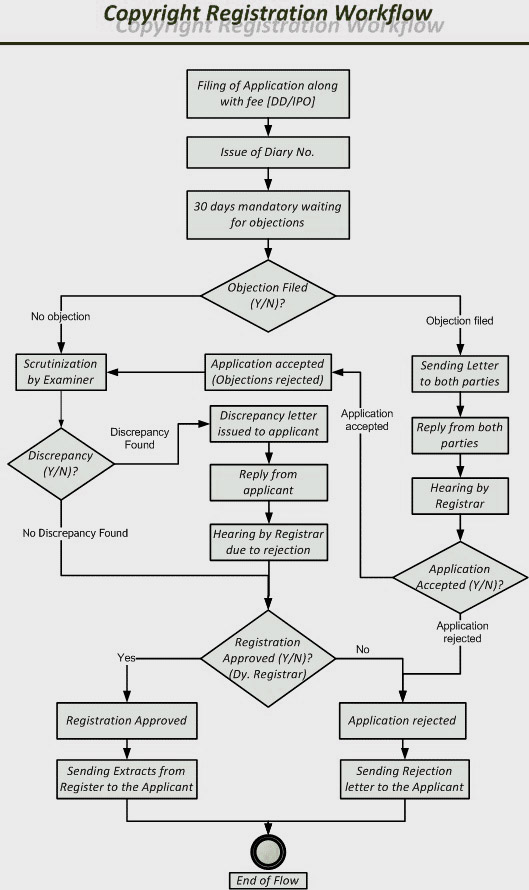“Hi, is it important to copyright protect my blog?”, asked another friend. “How can I stop copying of posts from my blog?”, yet another friend queried. Many people who run their own blogs and websites often ask me if they need to protect their content by getting copyright registration. And if yes, then how to apply for copyright in India. It is an important question because the content creator (i.e. a blogger or writer) invests time and other resources to create something of value. Many people are professional blogger and they make money from their blogs. So, their work should not be copied and misused by others. Let’s try to understand what copyright means for bloggers and writers. And also how to get copyright for blogs, websites and books. First thing first, let’s know what exactly is copyright. Well, copyright is the ownership of a creative work. This right has been provided to the creators by the Constitution of India. It ensures that no one else lay claim on the work and/or make profit out of your own work. Yes and no. If you’re publishing some creative work (like stories, novels, poems, photographs, drawings, sketches, digital art etc.) on your blog —it is recommended that you apply for copyright because this is really your intellectual property which could not have existed without your skills. You can also get copyright if you’re writing things like tutorials on your blog. Actually you can get copyright for any work of art that you can prove you have produced. But does a blogger publishing tutorials really need to take trouble to file for copyright? I don’t think so. If you publish something, that material is automatically copyrighted to you. As a blogger or writer, you do not need to explicitly assert your copyright. When you publish a post or book, it automatically gets covered by the copyright law and you become the copyright holder of the posted material. However, in court, if someone can prove that you had copied the posted material, you’ll lose the copyright and you may be punished. More importantly, especially for professional bloggers, you should not copy material from other blogs for another very simple reason. The reason is that Google heavily penalizes copied content. If someone copies your content and publish on their own blog, they are actually making the biggest mistake a blogger can make! So, you don’t really need to worry if you’re concerned in this regard. Nothing stops you from getting copyright on your blog posts —but you would need to see if the trouble is worth it. Later in the article, I will explain how to get copyright for a website or blog. No. As per the law, copyright is automatic. As soon as you create an original work, you’ll immediately become the copyright holder of that work. However, if you want to have a prima facie physical evidence of being the owner of that work, you can apply for copyright certificate. Therefore, copyright registration is totally optional and your should consider getting a certificate only if you’ve some really pressing reasons. Many people believe that if a blog is not displaying the standard copyright symbol then it is alright to copy the material without any problem. Well, such people are wrong! Your blog post is copyrighted to you even if you’re not displaying copyright symbol or the standard sentences like “all rights reserved”. However, it is recommended that you add the copyright symbol on your blog. It may deter above-mentioned folks to some extent. It’s easy to add copyright sign with HTML. Copyright covers your original expression. It does not cover facts. For example, if you write “the sun rises in the east” —it is a fact and anyone else is free to say the same thing on their own blogs. But if you express this fact in a special artistic way, for example using a peculiar combination of words and sentences, then you will have copyright on that original expression of yours. The fact will still be copyright-free but you’ll be the owner of that unique way-of-expression for the fact. In most cases, such a practice is legal. If you’re quoting the source and/or giving link to the source blog or website, the owner of those lines would not really mind. And even if someone does mind, you can always remove such a quote upon receiving a complaint. Quoting few lines is considered fair use in the court of law. In India, copyright is governed by the Copyright Act, 1957 and the Copyright Rules. The Government of India has recently setup the Copyright Office as a nodal agency to look after all the copyright related matters. You can e-file your copyright registration request. While applying, you’ll have to pay a fee to get the registration done. A website may contain a number of elements that are literary or artistic in nature. For example, words, graphics, videos, software and photos etc. As per the Copyright Office, you will have to file copyright registration request for each of these elements separately. Basically it means that you can get copyright on specific material but not on a complete website or blog. It is, therefore, a clumsy process to get copyright for a whole website or blog. Following work flow diagram gives you a visual idea of how the process works. This diagram is courtesy of the Copyright Office. Well, I hope this information on copyright was useful for you. Please feel free to ask questions and I request you to try to answer existing questions by commenting on this article. Thank you for using TechWelkin!

